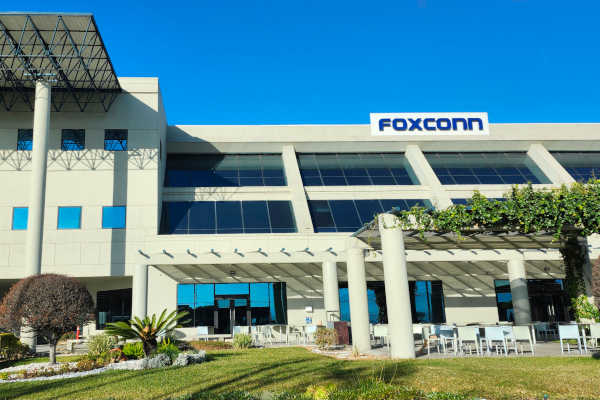Over the past 20 years, many companies, particularly in electronics, have outsourced manufacturing. One of the giants of contract manufacturing is Foxconn, the famous CM making Apple products in China. In addition to China, Foxconn has established manufacturing facilities in many countries, including Mexico.
The reshoring/nearshoring movement has companies considering Mexico as a viable low-cost alternative to China. The minimum wage in Tijuana as of January 2024 is approximately $2.25/hour. Land, facilities, and the overall cost of operations are lower, too.
I had the opportunity to visit Foxconn in Tijuana, Mexico, recently and was very impressed with this world-class manufacturing site where they are building consumer electronics, circuit boards, and medical products. As a guest of Foxconn, I was picked up at the San Diego airport and driven across the border – a journey of about 25 miles. After passing through Mexican Immigration at the border, it was an easy 10-minute drive to the Foxconn site.
Foxconn Baja California (FBC) was first established 35 years ago as a Sony manufacturing site. This site was sold to Foxconn in 2010, and it still produces Sony TVs. The operations include making electronic products assembly, 44 lines of surface mount technology (SMT) for circuit boards, and a separate building where medical devices are produced. A total of 5,500 employees work at FBC.
One of the key decision factors when selecting a CM is how employees are treated. Researchers cite information about how the treatment of employees affects productivity and quality. When employees are treated well, the whole operation benefits. For these reasons, companies outsourcing their manufacturing are likely to be very attentive to employee treatment at the factory.
I was impressed with how FBC treats its employees. Foxconn BC is considered a superior place to work compared to other companies in Tijuana. FBC employees are well-paid for the area and are required to work fewer hours. Employees are trained on how to perform their jobs, and about the devices they are making. In what is referred to as “The Fox Life Program,” a park-like exercise area was built on campus with a soccer field and a running track – all for use by the employees. Foxconn established a medical clinic across the street where employees and their families can get medical care. A newly remodeled cafeteria and an on-site bank and convenience store are also provided. I got the impression that FBC is a good place to work.
Another advantage of this location is the Port of Ensenada, about 1 hour south of Tijuana. Routing shipments through this ocean port avoids the congestion and cross-border import process of shipping through Long Beach/Los Angeles. Trucks heading north carrying finished goods for delivery to the U.S. cross the U.S./Mexico border at Otay Mesa, about 20 miles east of downtown San Diego. Commercial trucks crossing the border at Otay Mesa can take up to 4 hours of wait time.
The FBC factory was full of technology including robots, and computers for digital quality monitoring, and digital traceability - critical for medical products. The FBC engineering staff was very impressive.
At the end of the day, I was driven back to the San Diego airport. Pedro, my FBC driver, had a special permit to cross in the fast lane in Tijuana with a wait time of about 45 minutes. Passenger cars lined up in the other lanes were waiting 4-6 hours to cross into the U.S. American Customs and Border Protection was the bottleneck – understaffed and moving slowly.
SC
MR


Latest Supply Chain News
- MIT CTL offering humanitarian logistics course
- Bridging the ESG gap in supply chain management: From ambition to action
- Few executives believe their supply chains can respond quickly to disruptions
- Technology’s role in mending supply chain fragility after recent disruptions
- Tech investments bring revenue increases, survey finds
- More News
Latest Podcast

 Explore
Explore
Procurement & Sourcing News
- Bridging the ESG gap in supply chain management: From ambition to action
- Israel, Ukraine aid package to increase pressure on aerospace and defense supply chains
- How CPG brands can deliver on supplier diversity promises
- How S&OP provides the answer to in-demand products
- There is still work to do to achieve supply chain stability
- Blooming success: The vital role of S&OE in nurturing global supply chains
- More Procurement & Sourcing
Latest Procurement & Sourcing Resources

Subscribe

Supply Chain Management Review delivers the best industry content.

Editors’ Picks




